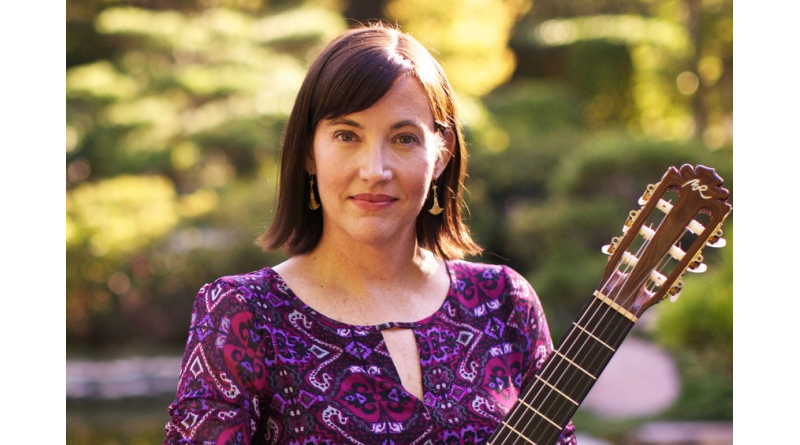Chelsea Green: From Punk Rock to AUC’s Music Director
By: Farah Abbas
@itsfarahabbas
Without warning, the lights went dark.
There was an electric moment on stage, one of nervous anticipation and energy.
The electricity was also felt in the audience as fans waited for the band, “Los Angeles Electric 8”, to begin their performance at the prestigious music festival in the United States, the Strathmore Guitar Festival.
That was 10 years ago, but for Chelsea Green, founder of the eight-member band and now Associate Professor of Music and Director of the Music program at AUC, that performance – and many others like it on tour – would help cement a 360-degree understanding of the music industry which would later help her launch a career in academia.
From being in a small middle school punk band playing in her friend’s garage, Green has gone through multiple paths to get to the current chapter of her life.
Embracing different experiences in the music industry is critical for a young musician’s development, she said.
“I always encourage my students to practice a lot during their twenties and experiment with new ways of playing before they encounter major responsibilities in their lives,” said Green, who currently teaches music history, introductory ethnomusicology, music theory and guitar performance at AUC.
But none of this would have happened had she not switched her major as an undergraduate student.
At first, Green studied Astrophysics at the University of California, Los Angeles (UCLA) before she found her way to her true passion – music.
“There is a path for everyone out there. We can forge a path for ourselves if one doesn’t exist. I forged a path for myself using my strengths and abilities despite the challenges,” Green told The Caravan.
Green now holds a Doctorate of Musical Arts, with a specialization in guitar performance, from UCLA.
Green’s parents were a bit concerned with her getting a music degree, but she added that there could be multiple career paths for a musician — either to go on tour and earn awards or form unique bands, which eventually paved the way to her professorship at AUC.
“Part of what’s awesome about being at university is that you have a chance to meet people who have similar interests. You have the time and often the resources to make stuff happen,” Green recalls of her undergrad years.
She used this opportunity to form a group called the Los Angeles Electric 8 in which she was the only woman. Los Angeles Electric 8, a chamber group of eight electric guitarists dedicated to reimagining classical and world music classical music, was at the time one of the first of its kind in the world.
The band implemented a unique idea where they transcribed and arranged classical and world music, and performed new compositions for eight electric guitars.
They performed in several national festivals such as Grand Performances, Sundays Live and many more.
“Sometimes when you come up with an innovative idea, you don’t even have to work that hard to make other people know about it. Sometimes they find you. We got tons of offers for The Electric 8 to start playing because people were intrigued by how unique the group was,” Green noted.
Green left the group in 2012 when academia came calling at AUC, but she believes that her experience with the band taught her a lot of leadership and communication techniques.
“This is why I encourage students that if they have an idea to make something happen, do it. And do it now! Do it while you’re at university so you will be able to use university resources,” said Green.
The alternative is to wait until after graduation, but then renting venues, equipment, audio and recording paraphernalia – even promotional material – may become prohibitively expensive.
Academically, Green maintains a balance between practice and play when it comes to learning music.
“Play is not goal-oriented. It is playing just for fun and being in the moment. Play involves navigating a lot of factors that are coming to us and responding to those factors in sophisticated ways,” Green said.
“It [play] makes us see what we’re capable of as individuals, whereas practice involves reaching a goal, such as maintaining a tempo of fixing mistakes,”
Her approach, and the distinction between practice and play, has helped her students learn the basics of music in a more fun and efficient manner.
“I started out the course as a complete beginner and now, I think I know enough to comfortably be able to understand music sheets,” says Janna Moataz, a Multimedia Journalism sophomore and one of Green’s previous students.
“She taught me new things about songs and how to deeply listen to them, especially the instruments in the background of each song. I now hear everything in the song other than the lyrics,” she added.
In 2020, the Rebus Community, a global online initiative working together to create and share Open Educational Resources (OER), published Green’s open textbook called Sight-Reading for Guitar: The Keep Going Method – the first open resource book published by an AUC professor.
The textbook teaches guitar players from all musical backgrounds to understand, read and play modern staff notation in real time. The Keep Going Method is designed to impart the knowledge, skills and attitudes needed for sight-reading with efficiency, fun, encouragement, and most importantly, it’s free for anyone to stream or download online.
“The experience has truly taught me a lot despite being very hectic. Every time I get an email from someone from Sri Lanka or Zimbabwe, which I do, it makes it all worth it,” said Green.
It seems like so long ago that Green first imagined herself as a musician. But childhood dreams often resonate well into adulthood, and those of us who can realize them are truly lucky.
For Green, it was her musical teacher Ted Norman who first inspired her to pursue this particular dream.
“He was my guitar teacher at UCLA, and he made me think that this is exactly how I want to be at 70 years old. He taught me that devoting your life to art kind of keeps you youthful and curious no matter how old you get,” said Green.
So, how does a musician unwind?
Jimi Hendrix, baby.
Guitarists around the world have deified Jimi Hendrix for revolutionizing rock music, putting it on the path toward electric distortion. Although he died at 27 in 1970, his influence has inspired millions of people to pick up the guitar.
Who hasn’t experienced Jimi?
“There are two things that continue to blow my mind about Jimi Hendrix. The first is his amazing ability to express himself so honestly and purely through guitar playing. His playing makes you remember what it is to be human, and he manages to do that in every song,” said Green.
She added that many musicians often simply try to sound good, but “good is boring”.
“I also like his pioneering curiosity about sound. He pioneered what we call Noise. It might not sound like it works well in a musical context. To some people it’s scary or ugly, but to others it’s beautiful and new. I happen to love noise and love Jimi for always walking the tightrope between sound and Noise and really changing the way I think about sound,” Green added.




